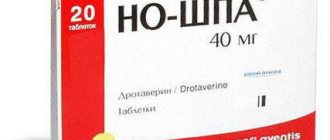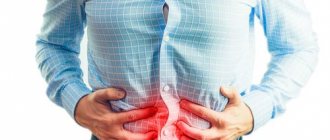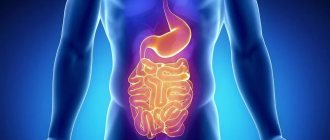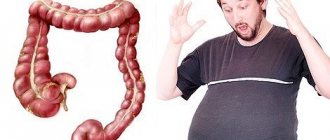The abdominal cavity contains the most important organs for normal life: the gastrointestinal tract, the reproductive system in women, and the immune glands (Peyer's patches) are located here.
Periodic heaviness and pain in the lower abdomen are not always harmless consequences of poor nutrition. Sometimes they are the initial signs of serious illnesses. Painful sensations can be the first signal of emergency conditions (intestinal volvulus, acute appendicitis). Let's look at the problem in detail.
- Causes
- Possible diseases
- How to get rid of heaviness in the lower abdomen
- Ways to treat and prevent feelings of heaviness in the lower abdomen
- Approach to treatment from the point of view of Tibetan traditional medicine
Causes of heaviness in the stomach
Heaviness in the stomach can be the cause of any diseases or simple non-compliance with nutritional rules. In order to prescribe effective measures to combat it, it is important to identify the main prerequisites for the occurrence of such a feeling. As a rule, if the severity does not arise due to overeating, but for some other reasons, then taking medications that eliminate this particular symptom will simply not be enough. It is important to treat the disease itself, and not relieve the symptoms.
Heaviness in the stomach
The causes of heaviness in the stomach can be:
- poor nutrition;
- binge eating;
- stress;
- gastrointestinal diseases;
- excess weight.
Excess weight is one of the possible reasons
The most common cause of heaviness is eating large quantities of food that cannot be quickly absorbed by the stomach. These can be fatty, fried foods, baked goods, soda, etc. As a rule, to eliminate problems, it is enough to start taking some kind of drug that improves the functioning of the stomach, as well as adjust your diet. It is important to switch to frequent meals in small quantities, as well as eliminate a number of foods and give up alcohol.
Advice! An active lifestyle and providing a favorable emotional environment can have a truly healing effect on the stomach and the body as a whole. Therefore, for people who often notice the appearance of heaviness in the stomach, it is recommended to make friends with sports, walks in the fresh air and reduce the number of stressful situations.
How to help yourself with heaviness in the stomach
It is important to remember that if severity occurs frequently, it is important to consult a doctor and carry out therapeutic measures only under his supervision. It is especially important to do this if a person has any other diseases, due to which there may be restrictions on taking even the simplest medications to improve the functioning of the stomach and intestines. It is also important to go to the clinic immediately if a person notices a fever, vomiting or diarrhea, and food is not digested. Lack of appetite, fatigue, abdominal pain, pale skin, etc. can serve as a signal to promptly contact a doctor.
Regular heaviness in the stomach is a reason to consult a doctor
Video: Pain and heaviness in the stomach, digestive problems
Constipation
Constipation is a condition in which it is difficult to have bowel movements. Many people with constipation experience bloating. This may be because hard and lumpy stool affects intestinal motility and increases bacterial fermentation. People may experience:
- less than three bowel movements per week
- stool may be hard, dry, or lumpy
- pain or difficulty with bowel movements
- it feels like not all the stool has come out
Treatment
Constipation can be treated at home. A person should eat foods high in fiber and drink more fluids. Physical activity is also necessary.
A person should train his intestines by going to the toilet at the same time every day. Doctors may also recommend laxatives if constipation is severe and other treatments don't help. If home remedies are ineffective, your doctor may prescribe stool softeners or refer you for surgery in severe cases.
Irritable bowel syndrome
Irritable bowel syndrome (
IBS) is one of the most common gastrointestinal diseases. Scientists don't know exactly why some people develop IBS, but several factors, such as motor skills, the body's interactions with the brain and gut, and distress, play a role. IBS is more common in women than men and becomes less common with age.
There are three different types of IBS:
- IBS-D - diarrhea accompanies irritable bowel syndrome
- IBS-C - constipation accompanies irritable bowel syndrome
- IBS-M - mixed bowel patterns accompany irritable bowel syndrome
Common symptoms of IBS include:
- pain or discomfort in the abdomen
- constipation, diarrhea, or both
- bloating and increase in abdominal size
- pain that can change location
- change in the nature and frequency of stool
Treatment
Treatment for IBS is mainly aimed at relieving symptoms. Doctors may recommend dietary supplements and laxatives for people with constipation. For diarrhea, your doctor may recommend Loperamide or probiotics. Increasing physical activity can relieve IBS symptoms. For severe symptoms, doctors may also prescribe a low dose of tricyclic antidepressants, such as doxepin, or selective serotonin reuptake inhibitors (SSRIs), such as Citalopram.
You should also avoid certain foods to help manage IBS symptoms. Avoiding wheat products, fruits and vegetables, and dairy products that contain carbohydrates may relieve symptoms.
Effect of drugs
All drugs that can be taken to eliminate heaviness in the stomach have different effects. But in general, their work is aimed directly at relieving this syndrome, as well as improving the activity of the stomach and intestinal motility. They will help prevent the development of any other symptoms and restore the functioning of the gastrointestinal tract. In general, they can significantly improve the general condition of the patient. However, all drugs can be divided into several groups according to their activity.
Review of drugs to eliminate heaviness in the stomach
Table. Types of drugs against severity.
| Type | Action |
| Prokinetics | Drugs of this type are aimed directly at improving the functioning of the stomach and can relieve pain. These are the drugs Ganaton, Motilium, Gastrikumel. They should not be taken for obvious toxicosis, during lactation, for gastritis and stomach ulcers, for children under 12 years of age and for internal bleeding. |
| Antacids | Normalize pH levels and eliminate heartburn. But they are effective only when correcting the diet. The group of these drugs includes Smecta, Rennie, Omeprazole, Phosphalugel. Prohibited in case of liver failure, excessive concentration of calcium in the blood, during feeding or carrying a baby. |
| Pancreatic enzymes | These drugs stimulate the functions of the stomach. Take them before meals or immediately after. These include the well-known Micrazim, as well as Pancreatin, Creon and Festal. Such drugs are not recommended for use by pregnant/nursing women or with an unspecified diagnosis. |
| Antispasmodics | Relieves pain and cramps in the stomach area. Effective only with complex therapy. The group of these medications includes Drotaverine, Meteospasmil. The drugs have the following restrictions: cannot be used to treat children under 12 years of age, during breastfeeding or pregnancy, for chronic diseases, especially in the acute phase. |
| Proton pump inhibitors | Eliminate heartburn and normalize acidity levels. These include Esomeprazole, Lansoprazole, Omeprazole and others. They cannot be used, like most other drugs, by expectant and nursing mothers in case of individual intolerance to any of the components included in the composition. |
Almost all drugs have contraindications
Possible diseases
Painful conditions that cause a feeling of heaviness in the abdominal and pelvic organs:
- Gastroenteritis (stomach flu) – caused by bacteria and viruses. Manifested by general malaise, high fever, chills.
- Conditions manifested by vomiting and diarrhea (overeating, poisoning).
- Gastroesophageal reflux and other conditions accompanied by low acidity (peptic ulcer, gastritis).
- Biliary dyskinesia. Other symptoms: nausea, lack of appetite.
- Biliary or renal colic (movement of stones in the gall bladder or urinary tract). Additionally, a high temperature is noted.
- Fibroids, endometritis, salpingitis, ovarian cysts. Often disguised as painful menstruation. Accompanied by purulent or bloody vaginal discharge.
- Premenstrual syndrome (PMS) is a common feature of the menstrual cycle.
Crohn's disease (pain occurs due to chronic inflammation of the mucous layer of the gastrointestinal tract). The causes of the disease include immunological, hereditary, and infectious factors.
Pain in the lower abdomen may indicate one of the following emergency conditions:
- malignant neoplasm;
- intestinal obstruction;
- acute appendicitis, peritonitis;
- ectopic pregnancy;
- pregnancy failure;
- acute kidney infection (pyelonephritis, glomerulonephritis).
Most Popular
Of course, first of all, when a person feels unpleasant symptoms, he goes to the pharmacy and buys something for heaviness in the stomach on the advice of the pharmacist. Although in fact, it is recommended to take any medications only after consulting a doctor. It is especially important to remember this for people who already have a number of health problems - taking the “wrong” drug can seriously harm yourself. Let's look at the basic medications that can be bought at the pharmacy.
Consult your doctor first
Mezim
It is often recommended to take it to eliminate heaviness in the stomach after heavy feasts with a lot of delicacies. The drug will also eliminate belching and can relieve nagging minor pain. It is recommended to take it in the amount of 1-3 tablets about 3-4 times during the day. Allowed for children under 12 years of age, but in small dosages. The drug acts quickly and can be used to treat a number of chronic gastrointestinal diseases. The action of Mezim is aimed, first of all, at improving the digestion process by replenishing the deficiency of a number of enzymes.
Mezim forte
On a note! After taking Mezim, you should not take a horizontal position. It is better to sit or stand until the effect appears. Otherwise, the tablet will begin to dissolve in the esophagus and will not have the desired effect.
Festal
The drug is usually taken when one-time digestive problems occur and facilitates the process of digesting food. Suitable for those who often suffer from flatulence or have problems with bowel movements. The course of treatment with the drug is usually short, but in the treatment of chronic pathologies it can last several months. Festal is taken 1 tablet during meals or immediately after.
Festal
Smecta
It is also a fairly well-known drug, which is most often used in cases of diarrhea. However, not everyone knows that this remedy perfectly helps with gastritis, ulcers and correcting the action of the gastrointestinal tract in case of prolonged malnutrition. Available in powder form in sachets, take 1 sachet 3 times a day, the contents of which dissolve in water. The medicine can be given even to small children. True, the dose will have to be adjusted: up to 1-2 years - 6 mg, over 2 years - 6-9 mg.
Smecta
Attention! An overdose of the drug can cause constipation.
Panzinorm
It is taken for disorders of the pancreas, dyspepsia and flatulence, as well as for a number of other diseases. It should be taken only as prescribed by a gastroenterologist. The tablet should be taken during meals or immediately after.
Panzinorm
Motilium, Motilak, Motonium
The drugs improve the activity of not only the stomach, but also the duodenum. They do not affect the secretion of the digestive organs. Good for vomiting. But they are not recommended to be used to treat children weighing less than 35 kg.
Motilium
Gastal
Has a positive effect on gastric acidity levels. It is often prescribed by doctors for diseases associated with increased production of gastric juice. The drug copes well with the effect of heaviness and relieves pain, eliminates belching and excessive heartburn. The functioning of the stomach and intestines will improve. Gastal is available in tablets. It should not be given to children under 6 years of age.
Gastal
On a note! Gastal is allowed to be taken after drinking alcoholic beverages, coffee and a number of medications that could provoke the production of excess acid in the stomach.
Rennie
A fairly well-known drug that is used to reduce stomach acidity - it breaks down acid into water and salts. Thus, pH values are normalized. However, you need to take the drug with caution, since its composition is similar to baking soda and can greatly change and even disrupt the acid-base balance of the stomach.
Rennie
Traditional methods
If you don’t have any medications at hand, and for some reason pharmacies are out of reach, then you can try to get rid of heaviness in the stomach using folk methods. For example, decoctions prepared with chamomile or yarrow can help. You can also try drinking a remedy made from calamus or fennel root. Tea with cumin or steamed seeds of a plant such as dill will also help overcome heaviness.
Chamomile decoction
On a note! A number of traditional medicine can also be used to prevent the onset of severity. But in any case, you shouldn’t abuse them.
You can also include buckwheat porridge in your menu as a preventive measure. It is recommended to temporarily replace raw fresh vegetables with stewed ones, and completely abandon fruits, replacing them with dried fruits.
Video: Heaviness in the stomach
Treatment
It depends on what disease is causing the heaviness in the lower abdomen; there are no uniform recommendations. Treatment may be like this:
- diet, digestive enzymes and antispasmodics for irritable bowel syndrome;
- chemotherapy or surgery for intestinal tumors;
- antibacterial and anti-inflammatory treatment for cystitis;
- venotonics and gymnastics for dilation of the pelvic veins;
- correction of hormonal status in case of menstrual irregularities;
- antibiotic therapy and metabolic agents for chronic gynecological inflammation;
- drugs to restore cartilage or implantation surgery for inflammation or destruction of the hip joint.
Be sure to read:
What medications should I use for increased gas formation?
First aid
Possible only with severity caused by physiological reasons:
- sorbents, drinking plenty of fluids and short-term fasting when overeating;
- rest in a lying position, warm-up on a fitball during pregnancy;
- dry heat on the lower abdomen and painkillers during menstruation.
Nutrition
Intestinal overload is always harmful, under any conditions. Those forces and resources that the body could spend on recovery have to be spent on digesting excess food. Therefore, in case of any discomfort, it is useful to adhere to a gentle type of nutrition.
Medicines
You can only take medications prescribed by your doctor. You are only allowed to take sorbents for indigestion and painkillers for painful periods on your own. Everyone else can seriously hurt themselves.
Folk remedies
Proven remedies for severe overeating:
- chamomile tea with mint;
- dill decoction;
- infusion of caraway seeds;
- milk thistle seed meal;
- herbal tea from St. John's wort;
- flowers of calendula and yarrow.
For discomfort during menstruation, an infusion of celery root, hop cones, and a decoction of burdock seeds will help.
Massage
Simple stroking movements along the intestines will help digest excess food. There is no need to press hard, just stroking and light vibration is enough.
In continuation of the topic, be sure to read:
- Irritable bowel syndrome: symptoms and treatments
- What medications should I use for increased gas formation?
- Details about the coprogram: preparation, conduct and interpretation of the analysis
- More about hemorrhoids: causes, symptoms and treatment methods
- Intestinal dyskinesia: types, causes, symptoms and treatment methods
- Heaviness in the stomach and abdomen after eating: pathological and non-pathological causes
- Causes of abdominal pain: pathological and non-pathological cases
- Causes of bloating and increased gas formation, treatment methods
- Polyfecalia: how it manifests itself, causes of the condition and treatment methods
- Why is there heaviness and bloating in the abdomen and how to eliminate the problem?
How to cope with heaviness in the stomach
Step 1. If unpleasant symptoms appear, you can take some medicine. It is important to read the instructions for use, do not exceed the dosage and pay attention to a number of contraindications. If any of them are present, then it is better to refuse to take this remedy.
Before taking, read the instructions
Step 2. You need to reconsider your diet and try to minimize the consumption of foods that can cause heaviness in the stomach - spicy, fried, difficult to digest.
Change your diet
Step 3. Don't overeat. If you are planning a large feast, it is important to control the amount of food you eat. You should also avoid eating at night.
Don't overeat
Step 4. While eating, it is recommended to chew your food well and do not swallow it in large pieces. It is better to eat slowly, in small portions and often.
Chew your food thoroughly
Step 5. It is important to give up carbonated water and a number of fruit juices. It's better to drink more clean water.
Avoiding carbonated drinks
Step 6. It is recommended to start losing weight and lead a healthy lifestyle, do not disturb your sleep and diet, and also play sports.
Lose excess weight
Step 7. If symptoms of heaviness in the stomach have become constant companions, then it is important to consult a doctor for advice.
Visit doctor
Step 8. It is recommended to minimize the amount of stress and not get nervous over trifles.
Try to be less nervous











